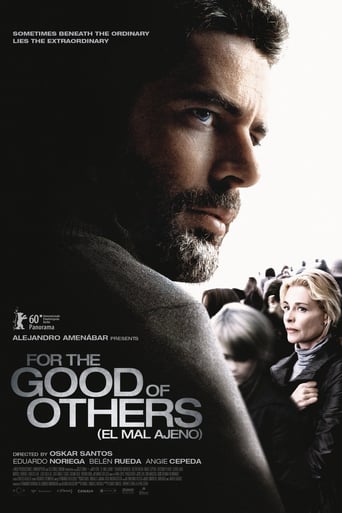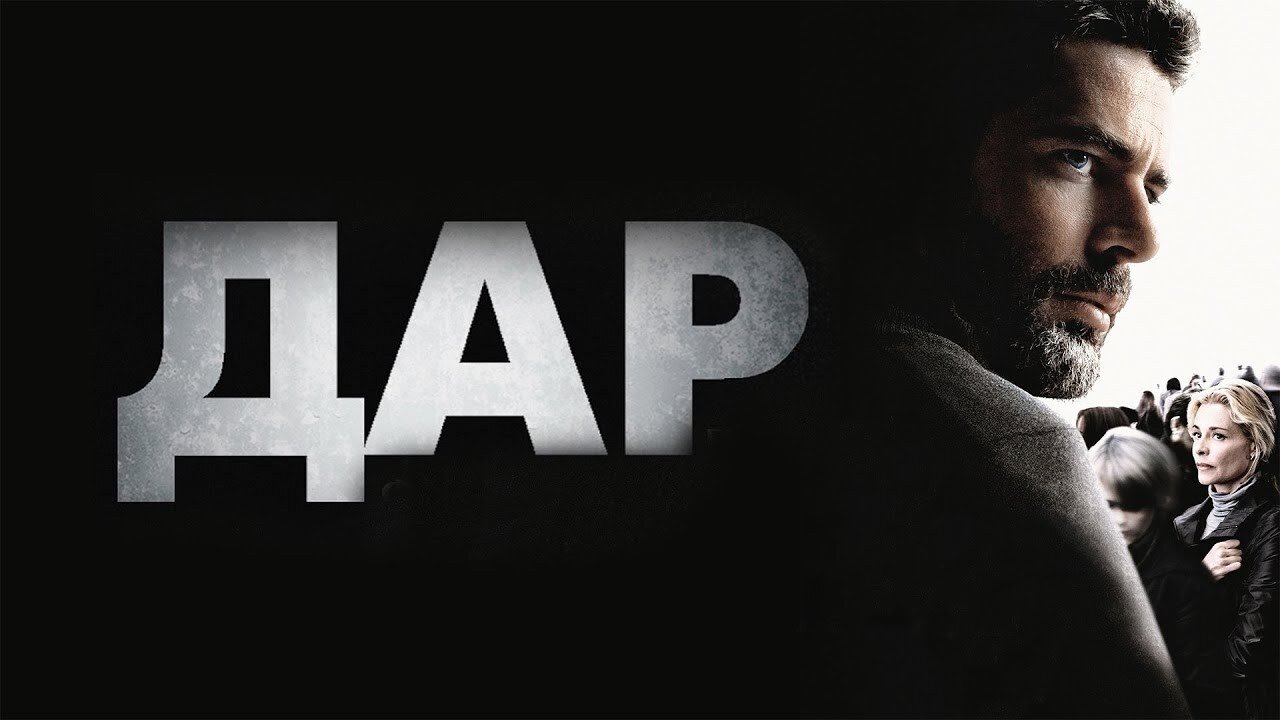Robert J. Maxwell
The direction is nearly flawless, the photography impressive, the acting professional, and the musical score consists of subdued strings -- no heavenly choirs or triumphant fanfares when a patient's life is unexpectedly saved. So why does it all seem unfocused? Diego is a doctor in a hospital in Spain. He's supposed to have lost compassion for those of his patients who are in pain, although I didn't see him as any more or less bored than any other doc.At any rate, a man rushes his pregnant and dying girl friend into the hospital. Diego tells him that it's unlikely that either the girl or the baby will survive. The man pulls a gun and plugs Diego, before touching Diego's hands, then he eats his own pistola.The man is dead and Diego severely wounded. They hurry Diego to his own hospital and try to stabilize him. There is a confusing shot of Diego lying on the gurney with his eyes staring at the camera and a sheet is pulled over his head, suggesting Diego has given up the ghost. But evidently he hasn't. What, then, did the hand of the potter shake? Diego recovers and thereafter things get a little weird. Diego resumes his duties and those of his patients who are on their way out begin to remit. However, Diego himself loses a family member he loves. And then, as the other patients do well, his daughter contracts an unnamed disease that looks like AIDS. And his wife develops something that sounds like leukemia.Diego appears to reach the same conclusion I did. He can heal magically with his hands -- an ability possibly passed on to him by the suicide -- but in doing so he must lose someone he loves. Quid pro quo.I filled that summary with conditionals -- "appears to", "evidently," and so on -- for a reason. The reason is that I wasn't at all sure I had a handle on what was going on. I don't know what the hell that drunken blond was doing in there. It's not exactly laid out in schematic fashion. It was disturbing enough that for a moment I thought I was stroking out myself.The lack of focus and clarity aside, it's a good movie -- a hospital drama with supernatural overtones. In America we pride ourselves on having a superlative medical system, and we do, but in Spain the hospitals look just like American hospitals. The staff know what they're doing, expensive CAT scans are readily available, the docs are just as condescending, the nurses equally officious, and the appointments -- the rooms, the appliances, the floors, the scrubs -- are all properly Listerian. If there's a difference between ethos and eidos in American and Spanish hospitals, you'd never knew it from this movie.I won't describe the ending, partly because it involves an heroic act of self sacrifice and partly because I'm not sure what happens.
Argemaluco
Director Alejandro Amenábar's name prominently exposed in the publicity of El Mal Ajeno could suggest that this is a film of a sneaky horror like The Others, or an elegant thriller like Abre los Ojos. However, I think that it is more appropriate to describe El Mal Ajeno like an interesting drama whose slight supernatural touches only work as catalysts of the drama and detonators of events which simultaneously reveal and define the main characters' nature. In other words, you do not have to expect "The Others in a hospital", but a reflexive film about medical ethic, personal responsibility and the unexpected consequences of a gift which becomes into a curse. Oh, and you do not have to expect an Amenábar's film either, because El Mal Ajeno was directed by Oskar Santos. I am afraid that this film is one of the many ones which suffered of an "IMC" (intentional marketing confusion). But anyway, I do not have to judge this movie under that condition, but under its number of pros and cons.The premise of El Mal Ajeno is interesting, but screenwriter Daniel Sánchez Arévalo tends to loose the focus of the story due to the quantity of coincidences and forced situations he employed to impulse the story. On the other hand, he could achieve ingenious parallels and deep analogies which reveal an ambitious and well planned narrative. The problem comes when Sánchez Arévalo's tricks accumulate and the screenplay looses the equilibrium due to the weight of the sub-plots, changing the direction on various times instead of following a fluid and organic flow. Despite of that, those excessive sub-plots do not feel like filler, but as valid explorations of the main subject. Sánchez Arévalo should have maybe left them for a hypothetical sequel, or he should have maybe made his screenplay longer in order to let the sub-plots to integrate themselves better to the narrative. Anyway, I think that a simplification of subjects, characters and events would have made El Mal Ajeno more linear and accessible, without loosing the emotional impact from its premise, nor its valid moral of "be careful with what you ask for, because you might end up obtaining it".For the positive sight, I can mention the solid performances from Eduardo Noriega, Cristina Plazas and Angie Cepeda. Belén Rueda brings a decent work, but her character belongs to the romantic interest of the story, something which in my humble opinion rose over. I would also like to mention Josu Inchaustegui's excellent cinematography, which combines the stereotypically cold palette from a hospital with warm details which emphasize the characters' humanity; all that is endorsed by a competent production design which is equally suitable for creating a credible clinical environment, without making it monotonous nor sterile. And finally, Santos' direction is solid, because he drives the movie at a good rhythm and he found the correct tone to tell the story. Pity that the screenplay looses the way in various occasions. Nevertheless, I think that there are more pros than cons in El Mal Ajeno, and despite not being a great nor highly memorable movie, I consider it to be worthy of a moderate recommendation because of its performances, good technical aspects, competent direction and its intention of leaving us thinking.
David Traversa
When The Exorcist was premiered it seems that its impact on believers was so great that people in the audience fainted, run out of the theater screaming, there were ambulances outside to take care of the sick, etc. This movie doesn't go that far of course, but I imagine that what they call "sensitive audiences" for rating purposes would view this film with awesome respect for what is going on within the story.I don't believe in anything so, my point of view lets me see this movie from a "naturalistic" perspective, no supernatural phenomena for me.I rented this movie because I thought Alejandro Amenabar was its director, he isn't, he was one of the producers, but even so, the technical part (photography, color, editing, sound, music, etc.) is absolutely perfect, silky the pacing, a pleasure to the eye and to the ear and the discovery of a new promising name in directing. The acting impeccable, and good entertainment too. Not bad for the price of a rental fee.
Peter L. Petersen (KnatLouie)
In this Spanish hospital-drama, Eduardo Noriega (Abre los ojos/Transsiberian) plays the main character, Diego, a doctor who has lost his passion for his work, and does not want to get too personal with any of his patients anymore. But one day, a pregnant woman tries to commit suicide, and is submitted to his care at the hospital. Her boyfriend is upset at the way Diego treats their case, and apparently tries to kill him, but instead of dying, Diego gets an incredible ability to heal people simply by touching them. However, Diego does not want this gift, and soon finds out that there is a much darker side to the ability, which makes his Jesus-like ability even less desirable, and he tries to get rid of it again.The film is a careful reminder that we should all treasure what we have, as we never know when it will be gone for good. The acting and directing is brilliant, and leaves us with a very touching and emotional movie, which will be remembered long after seeing the film for the first time.


 AD
AD


